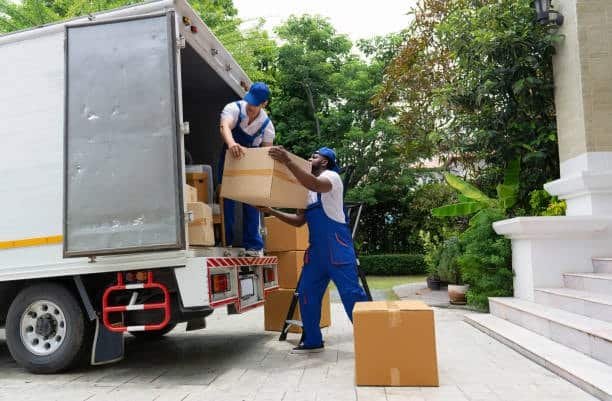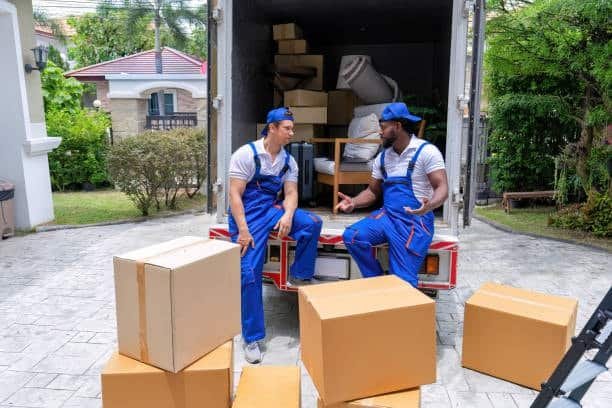Complete Guide to DDP Shipping Services: Door-to-Door Delivery Solutions for Global Trade
You can choose from a wide range of shipping options at GWT Worldwide, including competitive shipping fees . Transportation of your goods from China to other countries includes door-to-door delivery, customs handling and freight forwarding.
Keywords for Title Enhancement

- Door-to-Door Delivery
- The offer of international shipping solutions
- Customs Clearance is Part of The Process
- The Process of Global Freight Forwarding
- End-to-End Logistics
About Shenzhen Guanwutong International Freight Forwarding Co., Ltd. (GWT Worldwide)

GWT Worldwide merges on-time logistics, powerful supply chain services and impressive cross-border e-commerce logistics for customers. The company holds a strong position in the global market, Chinese and international markets, clearly showing how committed we are to helping businesses everywhere with dependable, cost-efficient logistics and ensuring a clear delivery agreement.
Our Core Service Portfolio
We provide shipping solutions for inbound shipments that match your timeline and budget, considering shipment costs and giving your shipments the best transit options no matter the item you are sending.
Through using rail networks, alongside sea or air freight we offer convenient cross-continent transport routes between Asia and Europe.
With our express services, those with important shipments can rely on our shipping insurance and fast delivery between global spots delivery duty paid.
We ensure the safe handling of customs fees and all necessary regulations by our customs clearance team and coordination with other government agencies, our strategic warehousing units give storage and distribution convenience delivered duty unpaid.
E-commerce Logistics is our area of expertise, allowing us to help you with FBA preparation and the necessary customs documentation required so that your sales on Amazon go smoothly pay customs fees.
Why Choose GWT Worldwide

Our company focuses on three values: being efficient, open and making customers happy. By joining logistics technology with a worldwide group of reliable partners, we guarantee your products move in safety, speed and following all international rules, from where they start to their destination shipping agreement.
If your company falls under either large or small operations, GWT Worldwide is a reliable partner that offers maximum responsibility to help you achieve your objectives by supporting smooth trading across the globe.

Our dedication to excellence covers more than regular shipping services, ensuring that you are informed about any additional costs . International shipping can be stress-free and easy because you get comprehensive guidance, real-time tracking and professional customer service at every moment of the process ddp shipping agreement.
What is DDP Shipping? Understanding Delivered Duty Paid Terms

The term DDP which means delivered duty is seen as one of the broadest definitions used in international business. With DDP, the seller is responsible for everything, including packing, sending, shipping and delivering the goods to the agreed-upon place of the buyer. It is the seller’s responsibility under this Incoterm to cover all transportation, insurance and export and import duties until the goods reach the final location transportation and associated costs.
The seller’s job under DDP shipping includes more than moving the goods to the buyer. They should handle the customs formalities of going through borders, ensure that all documents are accurate and comply with every relevant regulation in both the sending and receiving countries. It is for this reason that DDP shipping is attractive to buyers who prefer that others handle the logistics of shipping products across borders international commercial terms.
How DDP Shipping Works: The Complete Process Explained

The seller first takes charge of the goods at their premises as part of the DDP shipping and the process ends with a successful delivery at the buyer’s desired location. First, the seller takes care of export clearance, gets the required licenses and completes all essential documents for the country where the products are from. They set up and cover the payment for the primary logistics method which could be by shipping, airplane or truck until the final delivery export packaging.
On getting to the destination country, the seller handles all the import procedures and pays the required duties, taxes and fees. They communicate with customs brokers, handle any inspection procedures and keep to the stated regulations. At the end, the goods are delivered to the buyer’s premises which fulfill the DDP terms of the contract seller bears.
Key Benefits of Choosing DDP Shipping for Your Business

DDP shipping is ideal for companies that want their international transactions to be simpler. Users are happy knowing that the price quoted by the seller in the sales contract covers every expense until the goods are delivered ddp agreement. With this, you won’t see any unexpected charges, including destination country’s customs charges, and dealing with money overseas is made easy. Managing risks is simple since the seller takes responsibility for the goods at every step of the delivery.
Often, when DDP shipping is used, buyers spend much less time on order logistics. Firms are able to concentrate on what they do best instead of taking care of complicated shipping processes destination port. This method is especially handy for businesses that do not specialize in overseas shipping and those who only buy overseas goods only now and then. Making the process simple often makes delivery faster and reduces the number of tasks for the administration agreed upon destination.
DDP vs Other Shipping Terms: A Comprehensive Comparison

When looking at DDP together with other Incoterms, you can see that the parties’ responsibilities are not the same. Since DDP is different from FOB, sellers are accountable for all the preparations and delivery methods, duties rather than buyers. With EXW (Ex Works), sellers are responsible for making the goods available and the buyers are responsible for all handling and transportation tasks ddp transaction.
Under CIF terms, the exporter takes charge of ocean freight and the insurance, whereas the buyer is in charge of the import papers and processes. While DDP spells out every arrangement for the buyer, DDU omits duties and taxes from the tasks the seller must handle dap shipping. Distinguishing these areas allows businesses to pick loans that match their strengths and the amount of risk they are willing to take.
Who Pays What: Understanding DDP Shipping Costs and Responsibilities
In these DDP arrangements, it is the seller’s responsibility to cover all the costs of the shipping process. You should also plan for export documentation fees, handling of the cargo at the origin, the main cost of transport and marine or cargo insurance. Apart from the shipping price, sellers need to bear all expenses related to destination, for example, import duties, taxes, customs brokerage and terminal charges customs authorities.
The seller must take care of the movement of the goods from their facilities to the customer’s location in the buyer’s country, including transportation costs. In most cases, buyers are expected to remove products from the delivery place unless waived at the time of the contract. Clearly assigning expenses to each party lets them both know what they need to pay and prevents problems during shipping shipment arrives.
Documentation Requirements for DDP Shipping Success
Doing DDP shipping correctly requires you to be strict in meeting the documentation requirements of all the countries involved. Among the important papers are commercial invoices that describe each product and provide its details, packing lists showing the contents and weight and the contracts for transportation called bills of lading or airway bills tax payment. Depending on what is being exported and to which nations, export licenses might be needed sell internationally.
Documentation is also essential at this time, since clearance depends on customs declarations, certificates of origin and any certifications for the goods. Some goods are required to have insurance certificates, inspection reports and health or safety certificates by law. It is important for sellers to make sure every document is correct, contains all necessary details and fits the rules in both countries value added tax.
Common Challenges and Pitfalls in DDP Shipping
There are some problems with DDP shipping that could disrupt successful transactions. Customs delays present a big problem and may result from less than complete documentation, alterations in regulations or unplanned inspections. Because of these delays in import clearance , customers may have to pay more storage fees, extra demurrage charges and fail to meet commitment dates for delivery. Sellers should plan for different scenarios and add some time to their delivery schedules just in case sea freight.
The way currency moves may alter the duty and taxes you are charged, possibly making the total payment more expensive than you expected. When regulations change in the countries where goods are imported, this might affect what sellers need to pay in taxes and duties or change trade terms, resulting in lower profits for them. If communication between a seller, a customs broker and a transportation provider is poor, it could delay the process or cost more money seller assumes.
Best Practices for Implementing DDP Shipping Successfully
You need to plan carefully and pay attention to everything when using DDP shipping for your goals. It is important for sellers to have trustworthy customs brokerage partners in the countries they sell to, so the partners are aware of all local rules unknown costs. It is very important for accurate quotations in trade and smooth operations to keep up with all changes to import rules, settled duties and laws expenses incurred.
Insurance coverage that covers everything helps protect your goods when they are transported and pass through customs. Freight forwarders with DDP shipping experience can guarantee a reliable process and will help you address any problems. Talking to delivery drivers and buyers on a regular basis about delivery and the chance of delays helps maintain customer satisfaction and trust.
Technology Solutions for DDP Shipping Management
Modern technology tools make it much easier to handle DDP shipping. Such software allows you to watch your shipment in real time, automatically make important documents and ensure that customs rules are upheld. They make it possible for sellers to follow shipping from the first step, catching any problems early on.
Collaboration among sellers, freight forwarders, customs brokers and buyers is made easy by using shared tools from cloud-based platforms. Correct and manual error-free quotations are possible with automatic duty and tax calculation. EDI systems make it efficient to transfer required paperwork with customs and other parties involved.
Industries That Benefit Most from DDP Shipping
Certain sectors prefer DDP shipping thanks to their special way of working. E-commerce businesses make it easier for themselves to expand to different countries, using air freight since customers pay the same delivery price no matter what happens with customs. High-value and specialist equipment is much easier to ship under DDP arrangements that companies in the technology sector appreciate.
Using DDP shipping, fashion and retail companies are able to ensure customers everywhere receive the same high service. Many suppliers in the automotive industry choose to deliver products using DDP, guaranteeing proper timing for the next production stages. Many companies working in healthcare sectors rely on DDP shipping for its ability to keep up with the rules in heavily regulatory markets.
Legal Considerations and Risk Management in DDP Shipping
Shipping by this method requires knowledge of laws in several places and regulatory guidelines. The seller should keep track of their possible risks, including import and export duties as there might be complaints about delayed or damaged shipments or shipments that do not meet required regulations. Getting the right insurance is important so you are protected from theft, damages and penalties from customs.
The contract should state the places for delivery, the acceptable intervals for delivery and what to do when things go awry. Such clauses are meant to provide safety to parties from being held responsible for extraordinary events. Familiarizing yourself with labor rules, import requirements and business ways in each country makes it less likely that you’ll break the law.
Cost Optimization Strategies for DDP Shipping
Proper management of costs in DDP shipping involves careful outlines and flawless execution. Bringing several shipments together if you can will save money on each unit shipped while also making the process more efficient. Volumes of shipments can affect the prices from freight forwarders and customs brokers greatly.
Using available duty optimization strategies such as preferential tariff programs, helps lower how much is paid for imports. Proper packaging design means your items are protected and you can avoid paying higher charges. Scheduling shipments away from heavy traffic can, in addition to meeting customs requirements, reduce your expenses and improve how trustworthy your deliveries are.
Future Trends in DDP Shipping and International Trade
Progress in technology and changes in trade patterns are impacting and shifting the future growth of DDP shipping. Blockchain technology will offer more visibility and security when it comes to documents and money transfers in shipping. Artificial intelligence helps improve the routes delivered to, estimate expected delays and automate various compliance requirements.
Environmental issues push for greener ways of transport which affects the selection of shipping carriers and the routes used. Adopting digital customs and paperless trade makes it simpler for products to go through customs at borders. It looks like DDP shipping will get more efficient, open and more eco-friendly as it keeps helping international traders.
Choosing the Right DDP Shipping Partner
Having well-chosen DDP shipping partners plays a big role in your achievement in international trade. Look at potential partners in terms of where they are located, what they specialize in and what technologies they have, including connections with the international chamber . Money problems can be avoided if businesses are financially stable enough to meet their duty and tax obligations. The importance of good customer service grows as soon as shipping issues happen.
Partners should be able to provide import/export customs solutions, freight forwarding and last mile shipping services. Services that offer technology integration solutions improve both communication and monitoring in every stage of shipping. Hearing from other companies in the industry allows you to judge how dependable their services are.
Measuring Success: KPIs for DDP Shipping Operations
To manage DDP shipping well, it is necessary to pay attention to important performance measures for the sake of success. How often products are delivered in a timely manner reflects the dependability of the company and its customers’ contentment. Using the cost per shipment tracking reveals what areas of the business can be improved. The speed of customs clearance lets you judge how well documentation and brokers are doing their job.
How customers rate the service helps identify both the good and the bad sides of it. Rates of damage and how often insurance claims are made can show how well packages are handled and what quality of handling is given. These indicators help ensure that companies can keep making their DDP shipping better and compete more strongly in the world market..
Regional Considerations for DDP Shipping Worldwide
Every region has its own DDP shipping requirements, so it’s important to handle each situation differently for positive results. Markets in the EU use the same customs procedures, but they must follow complicated rules for products and the environment. Asian markets typically require traders to allow more time for shipping and to deal with complicated documentation.
There are usually fast customs processes in North America but tough security controls as well. There are difficulties in emerging markets because of their limited infrastructure and changing regulations. If sellers understand regional traits and potential hidden fees , they can choose the right strategy and expect suitable performance from DDP shipments.
Conclusion
Businesses can use DDP shipping to make handling international trades simpler by entrusting the most responsibility to the sellers. This term means buyers know the duty paid price in advance, have fewer admin tasks and uncomplicated operations, making it most appealing to businesses that do not have international shipping experience. For DDP shipping to work well, you must organize things well, keep your partners happy and pay attention to the rules and paperwork in different countries.


Thank you for reading!
Have questions, corrections, or better ideas? We’d love to hear from you!
We value every piece of feedback and promise to reply within 24 hours. Let's make this guide better together!
Note: Spam comments will not be published.